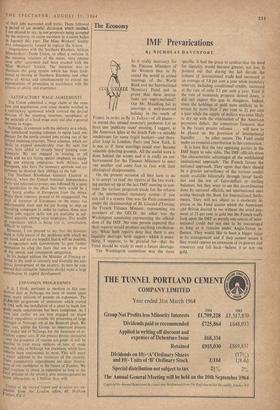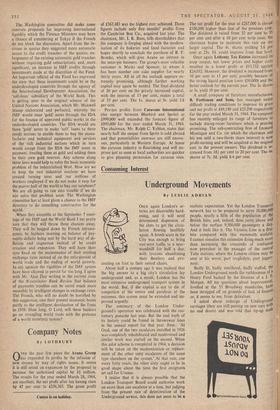The Economy
IMF Prevarications
By NICHOLAS DAVENPORT Is it really necessary for the Finance Ministers of the Western bloc to fly round the world to attend meetings of the World Bank and the International MECEE, Monetary Fund just to prove that these institu- tions are supra-national? Our Mr. Maudling hai to interrupt a well-deserved holiday in the south of France in order to fly to Tokyo—of all places— to attend this annual monetary jamboree. Let us have one 'publicity stunt' meeting, I suggest, at the American igloo at the South Pole—a suitable rendezvous for some frigid bankers—and there- after keep to London, Paris and New York. It is not as if these meetings could ever become valuable debating grounds. All the useful work is done behind the scenes and it is really an em- barrassment for the Finance Ministers to meet one another and come face to face with their ideological disagreements.
On the present occasion all they have to do is to accept 'as read' the reports of the two work- ing parties set up at the last IMF meeting to con- sider the various proposals made for the reform of the international monetary system—if you can call it a system. One was the Paris committee under the chairmanship of M. Giscard d'Estaing, the French Finance Minister, representing ten members of the OECD; the other was the Washington committee ,representing the official- dom of the IMF. No sane person expected that their reports would produce anything revolution- ary. While both reports deny that there is any liquidity shortage, both suggest--which is some- thing, I suppose, to be grateful for—that the Fund should be ready to meet a future shortage.
The Washington committee was the more
specific. It had the grace to confess that the need for liquidity would become greater, not less. It pointed out that during the last decade the volume of international trade had increased at an average of 5.8 per cent a year while monetary reserves, including conditional credits, increased at the rate of only 3.3 per cent a year. Even if the rate of economic progress slowed down, it did not expect this gap to disappear. Indeed, since the holdings of gold were unlikely to in- crease by more than 2 per cent to 21 per cent a year while the supply of dollars was even likely to dry up with the elimination of the American payments deficit, the committee forecasts that 'in the future greater reliance . . . will have to be placed on the provision of international liquidity . . . by other means. The Fund could make an essential contribution in this connection.'
It is here that the two opposing parties in the IMF begin to take sides. The IMF officials stress 'the characteristic advantages of the multilateral institutional approach.' The French favour the national approach. They agree that there should be a greater surveillance of the various credits made available bilaterally through 'swap' facili- ties and the use of Euro-dollars or sterling balances, but they want to see this co-ordination done by national officials, not international ones acting through the Bank for International Settle- ments. They will not object to a moderate in= crease in the Fund quotas which the Americans and British desired to see without the usual pay- ment of 25 per cent in gold but the French really look upon the IMF as merely one source of inter- national credit but not one to be encouraged as long as it remains under Anglo-Saxon in- fluence. They would like to have a bigger voice in its management and if they cannot secure it they would oppose an extension of its powers and resources and fall back—believe it or not—on gold. The Washington committee did make some concrete proposals for improving international liquidity which the Finance Ministers may have a chance of considering at Tokyo if the French do not block the discussion. Apart from the in- crease in quotas they suggested more automatic access to the credit tranches of the quotas, en- largement of the existing automatic gold tranches without requiring gold subscriptions, and, more significant, an increase in IMF credits through investments made at the discretion of the Fund. An important official of the Fund has expressed the view that these investments could be in the underdeveloped countries through the agency of the International Development Association, the 'soft-loan' subsidiary of the World Bank. This is getting near to the original scheme of the United Nations Association, which Mr. Maxwell Stamp elaborated and perfected, whereby the IMF would' issue 'gold'. notes through the IDA for the finance of approved public works in the underdeveloped countries. The IDA would use these 'gold' notes to make 'soft' loans to these needy nations to enable them to buy the manu- faciures and technical equipment and services of the rich industrial nations which in turn would accept from the IDA the IMF notes in payment, treating them as gold and adding them to their own gold reserves. Any scheme along these lines would help to solve the basic economic problem of the industrialised West. How are we to keep the vast industrial machine we have created turning over and our millions of workers employed if we do not make it easy for the poorer half of the world to buy our surpluses? We are all going to run into trouble if we do not solve this problem soon. The Washington• committee has at least given a chance to the IMF directors to do something constructive for the world.
When they assemble at the September 7 meet ings of the IMF and the World Bank I am pretty sure that they will throw these chances away. They will be bogged down by French intransi- gence, by bankers insisting on balance of pay- ments deficits being met by the hard way of de- flation and stagnation instead of by credit creation and expansion. They will have their eyes fixed on the maintenance of their existing exchange rates instead of on the enlargement of world trade and the ending of world poverty. In my opinion the rigidities of the IMF system have been allowed to persist far too long. I agree with Mr. Alan Day writing in the current issue of the Westminster Bank Review that balance of payments troubles can be cured much more smoothly by intelligent changes in exchange rates. The French, who will no doubt be horrified by this suggestion, owe their present economic boom partly to the intelligent devaluation of the franc in 1958. How long, 0 Lord, will these bankers go on strangling world trade with the pretence of a world monetary system?



































 Previous page
Previous page